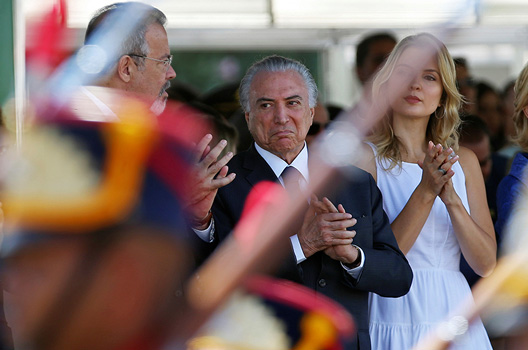 In his first speech as the new acting president of Brazil, Michel Temer said on May 12 that he would form a government of “national salvation.” It was an interesting choice of words: given the depth of the problems the country is facing right now Brazil clearly needs some sort of redemption. But if you think that means Brazilians must only focus their energy on finding solutions for the economy, think again. The real monster Brazil must face after former President Dilma Rousseff was sidelined is rebuilding its political system.
In his first speech as the new acting president of Brazil, Michel Temer said on May 12 that he would form a government of “national salvation.” It was an interesting choice of words: given the depth of the problems the country is facing right now Brazil clearly needs some sort of redemption. But if you think that means Brazilians must only focus their energy on finding solutions for the economy, think again. The real monster Brazil must face after former President Dilma Rousseff was sidelined is rebuilding its political system.
Obviously, Brazil’s government has to tackle the economic crisis. Brazil’s economy shrunk 3.8 percent in 2015. The most recent projections indicate a similar contraction this year, and probably no growth in 2017. Brazil now suffers from unemployment rates above 10 percent, severely declining investment and industrial production, and, worst of all, out-of-control public debt.
There is a consensus in government and society alike that painful reforms must be conducted. These include fiscal adjustment with large expense cuts and possibly higher taxes; labor and pension reforms; and a multitude of other recalibrations of national policy—all toward less state intervention in the economy. Even the understanding that these reforms will take time, and that sustainable growth will be years in the making, is reasonably accepted by most Brazilians.
There are differences, however, over how far the reform pendulum should swing, and on how to spread the burden through all income sectors. Those are questions that are as much political as they are economic. Arriving at answers that unify the country and put Brazilians back on track to reduce inequality is a political challenge, not an economic one.
Political problems are always hard to resolve in Brazil, but the landscape is particularly dire now. The controversial impeachment process that opened a Senate trial against Rousseff on May 11 was traumatic for the country. It exacerbated old divisions in the electorate to a degree not seen since the democratization of 1985, and raised new questions about the popular confidence in Brazilian institutions. After all, polls show that almost the same number of Brazilians that favored Rousseff’s impeachment—around 60 percent—want to oust Temer.
In the end, there is little disagreement that the impeachment was a political process, made possible by the crumbling of Rousseff’s support in Brasília. And now it is Temer’s job to build and maintain a stable coalition within the very same demanding and fickle Congress that abandoned Rousseff just days before the crucial vote.
Here is where the failures of Brazil’s political system come to the forefront. Brazil’s complicated model of representative democracy has given rise to more than thirty political parties with little ideology or platform—twenty-five of which have seats in Congress. Forming coalitions and keeping them is a truly herculean effort.
Those who voted against Rousseff no doubt expect dividends from her replacement. Temer will have to offer extraordinary concessions to those twenty-five parties if he wants to pass meaningful legislation. This is already evident in the formation of the new cabinet: while the finance and foreign ministers—Henrique Meirelles and José Serra, respectively—are widely-respected choices, the distribution of cabinet positions among small parties with big demands angered the public as soon as the president was inaugurated. It also did not escape Brazilians that this is the first time in thirty-seven years that a president has nominated a cabinet formed entirely of white men.
And this is just the beginning. How will Congress behave when Temer introduces his proposed reforms and social fractures spark disputes over taxes, retirement, and expenditure cuts? Where will loyalties fall when more than a dozen parties start competing for positions, amendments, and budget allocation before municipal elections scheduled for October? What will politicians ask of this frail new government when corruption investigations move forward and continue to threaten their leaders?
The silver lining of the systemic crisis affecting Brazil is that talk of political reform is back. After decades of burying their heads in the sand, Congress, media, academia, and society at large have started to whisper about reform again. This is already progress: in the past, reforms that emerged out of the political class alone did not go very far and certainly did not fundamentally change the fragmented nature of the system. Only when groups across different sectors of civil society get together for long-term discussions about a new model will significant proposals emerge.
Much like economic reform, political reform, too, will take time. There is no cookie-cutter formula to solve the problem; seemingly more stable models like parliamentarianism cannot work unless the political class and its division of power evolves first. This is a task that demands patience, with incremental changes toward milestones over five, ten, fifteen, and twenty years. And, finally, it is an absolute requirement that new political voices be at the center of this change, as younger generations will be the ones implementing it in the future. Perhaps the mobilization that has taken place on the streets of Brazil in the past year will lead to more engagement of these new leaders.
Andrea Murta is an Associate Director in the Atlantic Council’s Adrienne Arsht Latin America Center. Follow her on Twitter @murta30.
Image: Brazil’s interim president, Michel Temer, attends a meeting with defense officials regarding the security of the 2016 Rio Olympics at the Planalto Palace in Brasília on May 16. (Reuters/Ueslei Marcelino)
